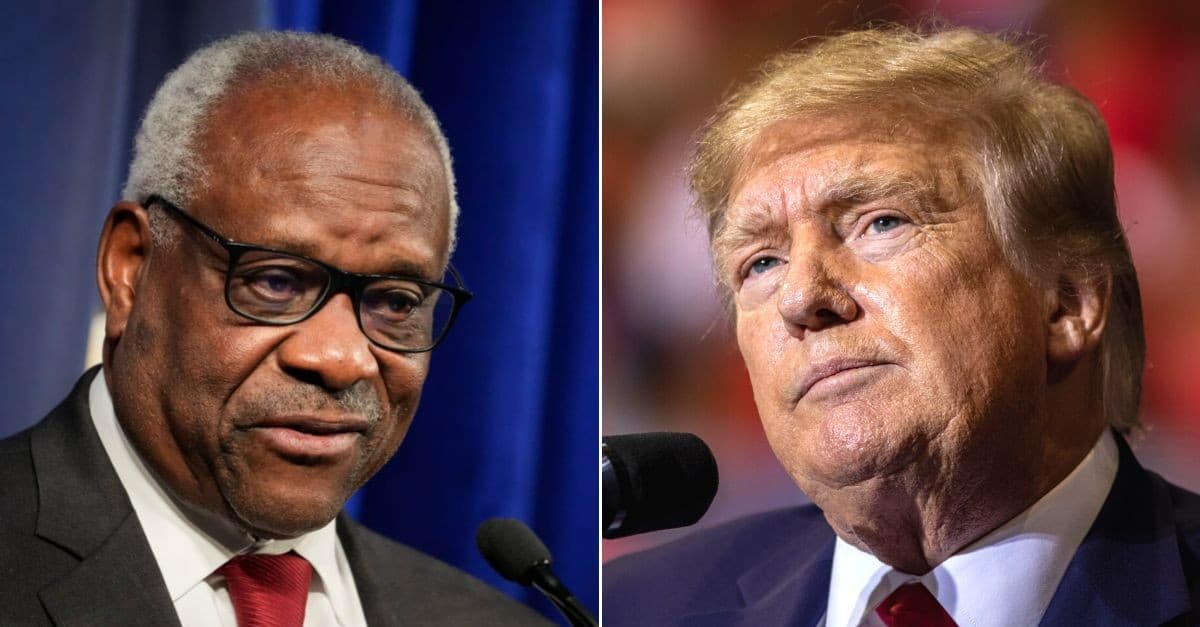OPINION: This article may contain commentary which reflects the author's opinion.
Former President Donald Trump is taking the Department of Justice to the Supreme Court where they will have to face Justice Clarence Thomas.
The former president has requested that the Supreme Court squash an appeals court ruling that halted another court’s ruling to allow a special master to review documents marked classified.
And Justice Thomas, who has jurisdiction over that appeals court, has set a deadline of next Tuesday at 5 p.m. for the Department of Justice to respond, the Washington Examiner reported.
The deadline was set hours after lawyers for Trump requested the Supreme Court vacate the partial stay order from the U.S. Court of Appeals for the 11th Circuit that allowed the DOJ to continue to look through the roughly 100 allegedly classified documents the FBI seized from Trump’s Florida resort in August.
The ruling from the appeals court reversed a decision by Judge Aileen Cannon, who ruled that the DOJ would have to provide seized documents with classified markings to special master Judge Raymond Dearie for independent review seeking privileged materials.
It comes after the special master assigned to review more than 11,000 documents seized from Mar-a-Lago made a ridiculous request that the judge in the case quickly dismissed.
He wanted the former president’s attorneys to declare whether all of the more than 11,000 documents were accurate and he wanted them to do it in eight days.
Not only would that be a monumental task, but the attorneys have not seen every document as some are marked classified, the Western Journal reported.
It was a request absurd enough that it got struck down by the same federal judge who appointed the special master in the first place.
On Thursday, just one day before the deadline, U.S. District Judge Aileen Cannon ruled that Trump wouldn’t be forced to comply, according to UPI.
“There shall be no separate requirement on Plaintiff at this stage, prior to the review of any of the seized materials,” the judge said.
“The Court’s Appointment Order did not contemplate that obligation,” she said.
The directive had been issued by senior federal Judge Raymond Dearie — appointed to assess whether some of the documents seized in the Aug. 8 raid were privileged — who wished to address implications from Trump on social media that the FBI might have planted evidence during the raid.
Even though there were over 11,000 documents, Dearie wanted Trump’s team to meet a Sept. 30 deadline to identify items in the inventory “that plaintiff asserts were not seized from the premises.”
“This submission shall be plaintiff’s [Trump’s] final opportunity to raise any factual dispute as to the completeness and accuracy of the Detailed Property Inventory,” he said.
But around 100 of the documents were marked classified with limited the former president’s attorneys from seeing them.
“Additionally, Plaintiff currently has no means of accessing the documents bearing classification markings, which would be necessary to complete any such certification by September 30, the currently proposed date of completion,” the former president’s attorneys said.
The judge said that “[s]hould any additional matters surface during the Special Master’s review process that requires reconsideration of the Inventory or the need to object to its contents, the parties shall make those matters known to the Special Master for appropriate resolution and recommendation to this Court.”
The judge also said that the former president’s attorneys did not have to provide details to executive privilege claims as the special master reviews the documents.
He initially asked that the former president log documents “in categories more specific than what Cannon’s order appointing the special master had laid out,” CNN said.
“Trump objected to making the executive privilege distinction Dearie proposed. Cannon adopted other aspects of Dearie’s plan for how the documents should be categorized,” it said.
In his own filing in September, Dearie said he has “determined that the efficient administration of the Special Master’s duties requires the assistance of the Honorable James Orenstein (Ret.), a former United States Magistrate Judge for the Eastern District of New York, who has experience with complex case management, privilege review, warrant procedures, and other matters that may arise in the course of the Special Master’s duties.”
